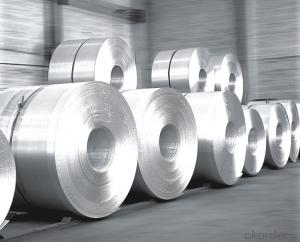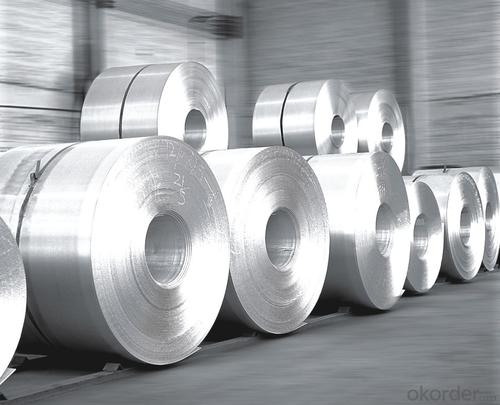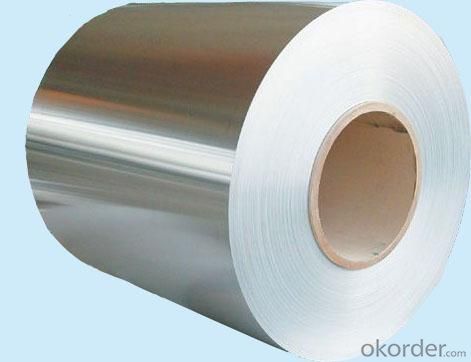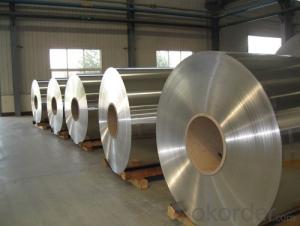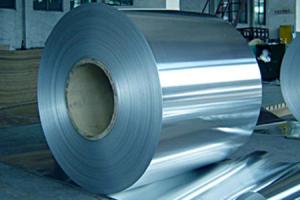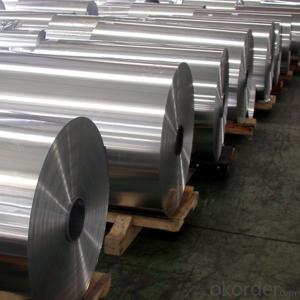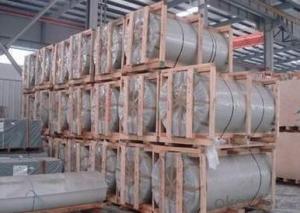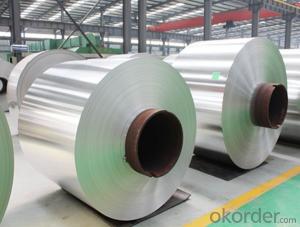Mill Finished 1050 Aluminum Coil Spool for Rolling
- Loading Port:
- Shanghai
- Payment Terms:
- TT OR LC
- Min Order Qty:
- 5 m.t.
- Supply Capability:
- 1000 m.t./month
OKorder Service Pledge
OKorder Financial Service
You Might Also Like
Specification
1. Structure of Mill Finished 1050 Aluminium Coil for Rolling Description
Mill Finished Aluminium Coil for Rolling is one semi-finished aluminium material. This coil can be rolled down to aluminium coil,sheet,circle ect. The alloy AA1050 is widly used in building, industry ect. Its weight is much lower than steel. So many customers choosed aluminium material instead of steel.
2. Specification of Mill Finished 1050 Aluminium Coil for Rolling
Mill Finished Aluminium Coil for Rolling | |
Main Specification | |
Alloy | AA1xxx (AA1050, AA1060, AA1070, AA1100 etc.) |
AA3xxx (AA3003, AA3004, AA3005, AA3105 etc.) | |
AA5xxx, AA6XXX (AA5052,AA5083, AA5754, AA6061, AA6062 etc.) | |
AA8xxx(AA8011, AA8006 etc.) | |
Temper | H14,H16, H18, H22, H24, H26, H32,O/F, T4, T6, T651 |
Thickmess | 0.01mm-100mm |
Width | 30mm-1700mm |
Standard | GB/T 3880-2006/ASTM |
Special specification is available on customer's requirement | |
3. Application of Mill Finished 1050 Aluminium Coil for Rolling
(1).Interior: wall cladding, ceilings, bathrooms, kitchens and balconies, shutters, doors...
(2).Exterior: wall cladding, facades, roofing, canopies, tunnels,column covers , renovations...
(3).Advertisement: display platforms, signboards, fascia, shop fronts...
4. Feature of Mill Finished 1050 Aluminium Coil for Rolling
Surfact Quality :
Be free from Oil Stain, Dent, Inclusion, Scratches, Stain, Oxide Dicoloration, Breaks, Corrosion, Roll Marks, Dirt Streaks and other defect which will interfere with use,
Mechenical Property:
Chemical Composite and Mechanical Property
5. Certificate of Mill Finished 1050 Aluminium Coil for Rolling
SGS and ROHS(if client request, paid by client), MTC(plant provided), Certificate of Origin(FORM A, FORM E, CO), Bureau Veritas and SGS (if client request, paid by client), CIQS certificate
6. Image of Mill Finished 1050 Aluminium Coil for Rolling
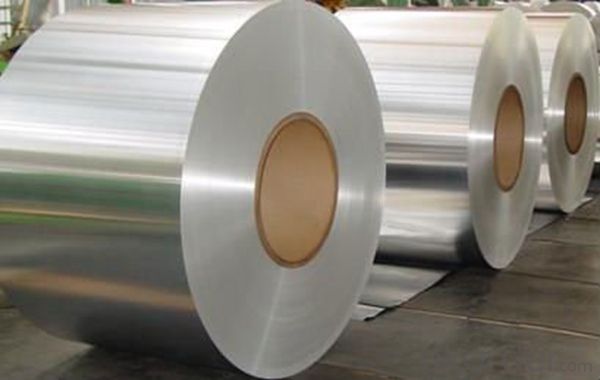
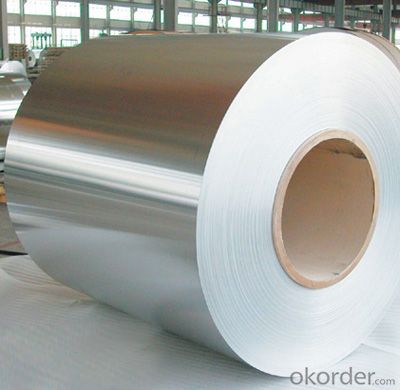
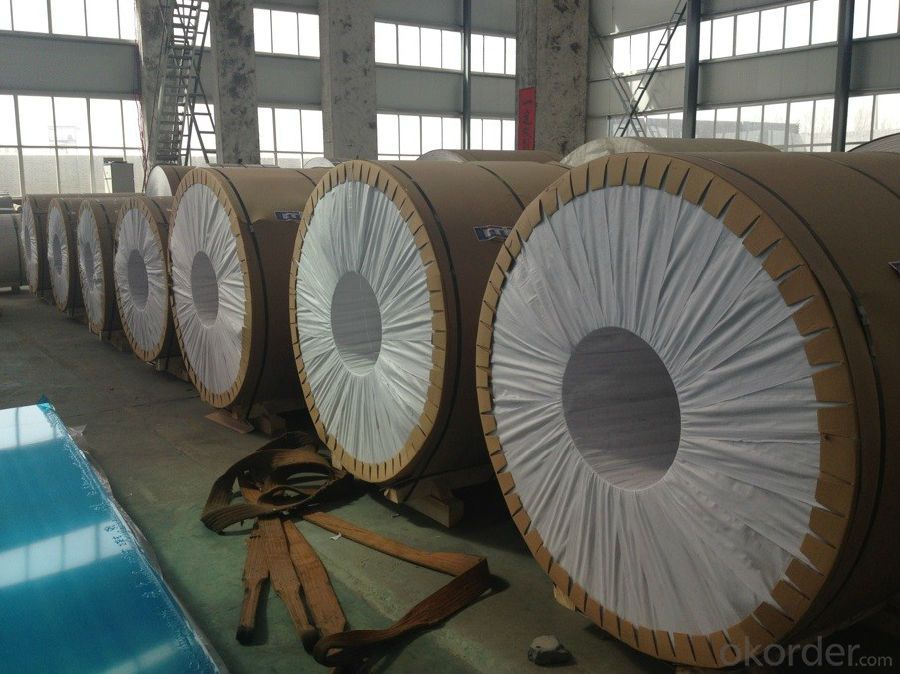
7. Package and shipping of Mill Finished 1050 Aluminium Coil for Rolling
First, plastic cloth with drying agent inside; Second, Pearl Wool ; Third, wooden cases with dry agent , fumigation wooden pallets, aluminum surface could cover blue PVC film
8. FAQ
1) What is the delivery time?
Depends on actual order, around 20 to 35 days
2) What is the QC system:
We have QC staff of 20 persons and advanced equipment, each production is with MTC traced from Aluminum ingot lot.
3) What market do you mainly sell to?
Australia, America, Asia, Middle East, Western Europe, Africa etc
- Q: Which companies will use aluminum sheet and coil?
- Aluminum sheet coating plant
- Q: I had a small exclusive group of friends in high school of nine people. For Christmas every year we'd have a get-together and exchange gifts. Now, I was never fond of the, He got something different! or, Why did she get a book and I got a scarf? So I would always give my friends each the same thing, but personalized for them.One year I made aluminum foil sculptures for them because I was especially poor...And they loved them! They ranged from a dragon, an elephant, a pacifier, to a tiny martini glass. I was really surprised that everyone liked them.So do you think that I could make these and sell them at craft fairs? I don't know...it's just something I've been thinking about recently and wondering if it would work.
- I okorder / (...click on Wire and Aluminum Foil, and also on Other Uses and Ideas...) If you do it well, I'd assume that custom figures would be totally possible too (be sure to charge more for custom work right from the get-go!). HTH, Diane B.
- Q: Are aluminum coils suitable for manufacturing cookware?
- Yes, aluminum coils are suitable for manufacturing cookware. Aluminum is a popular choice for cookware due to its excellent heat conductivity, which allows for even heating and efficient cooking. It also has a lightweight and durable nature, making it easy to handle and long-lasting. Additionally, aluminum is resistant to rust and corrosion, making it an ideal material for cookware that is frequently exposed to water and heat. However, it is important to note that uncoated aluminum cookware may react with certain acidic or alkaline foods, leading to a metallic taste. To overcome this, many aluminum cookware manufacturers use non-stick coatings or anodized finishes to prevent food reactions and improve the durability of the cookware. Overall, aluminum coils are a suitable material for manufacturing cookware, but it is essential to consider the specific requirements and coatings needed for different types of cookware to ensure safety and optimal performance.
- Q: Where can I purchase used aluminum coil over the internet?
- <p>Yes, you can buy used aluminum coil online. There are various online platforms and marketplaces where you can find used aluminum coils for sale. Websites like eBay, Alibaba, and specialized metal trading platforms often list used aluminum coils. Additionally, you can check with local recycling centers or metal suppliers who may have used aluminum coils available. Always ensure to verify the condition, specifications, and authenticity of the product before making a purchase.</p>
- Q: How are aluminum coils priced?
- Aluminum coils are priced based on a variety of factors including the current market price of aluminum, the size and thickness of the coils, the quantity being purchased, and any additional customization or processing requirements. The market price of aluminum is influenced by factors such as supply and demand, global economic conditions, and trade policies. The size and thickness of the coils can affect the cost as larger or thicker coils generally require more raw materials and production time. The quantity being purchased can also impact the price, as larger orders may receive volume discounts. Additionally, if the coils require any additional customization or processing, such as coating or shaping, this can also impact the overall price. Overall, the pricing of aluminum coils is a complex process that takes into consideration various factors affecting the cost of production and market conditions.
- Q: Are aluminum coils suitable for use in heating applications?
- <p>Yes, aluminum coils can be used for heating. They are known for their excellent thermal conductivity, which allows for efficient heat transfer. Aluminum's lightweight nature and resistance to corrosion make it a popular choice in various heating applications, such as in electric heating elements, heat exchangers, and cookware. However, it's important to note that aluminum's low melting point means it's not suitable for high-temperature applications and should be used within safe temperature limits to prevent melting or damage.</p>
- Q: How are aluminum coils tested for strength and durability?
- Aluminum coils are tested for strength and durability through a rigorous process that involves several methods. One common method is tensile testing, which measures the maximum amount of stress a coil can withstand before it breaks or deforms. This test helps determine the overall strength and elasticity of the aluminum. Another important test is the hardness test, which measures the resistance of the aluminum coil to indentation or scratching. This test helps determine the durability and wear resistance of the material. Furthermore, aluminum coils are often subjected to fatigue testing, where the material is repeatedly subjected to cyclic loading and unloading. This test helps simulate real-life conditions and assesses the coil's ability to withstand repeated stress without failure. Additionally, corrosion resistance is a critical factor in determining the durability of aluminum coils. Therefore, various corrosion tests are conducted, such as salt spray testing, to assess the coil's resistance to environmental factors that may lead to corrosion or degradation over time. In some cases, non-destructive testing methods like ultrasonic testing or eddy current testing are employed to detect any internal defects or inconsistencies within the coil that may affect its strength and durability. Overall, a combination of mechanical, physical, and chemical tests are conducted on aluminum coils to ensure they meet the required strength and durability standards. These tests help manufacturers and consumers have confidence in the quality and reliability of the aluminum coils for various applications.
- Q: Can aluminum coils be painted or coated with other materials?
- Yes, aluminum coils can be painted or coated with other materials. This process is commonly done to enhance the appearance, protect against corrosion, or improve thermal insulation properties of the coils.
- Q: What type of equipment is used to process aluminum coils?
- The equipment employed for aluminum coil processing varies depending on the specific manufacturing process and requirements. Nevertheless, there are several common types of equipment used in this process: 1. Uncoilers/Decoilers: These machines are utilized to unroll and straighten the aluminum coils, facilitating further processing. 2. Levelers: Leveling machines are employed to flatten the surface of the aluminum coil, ensuring it is even and flat before proceeding with additional processing. 3. Slitters: Slitting machines are used to cut the aluminum coil into narrower strips of desired widths. This equipment finds frequent use in industries such as automotive, construction, and packaging. 4. Shears: Shearing machines are employed to cut the aluminum coil into specific lengths or shapes required for the manufacturing process. 5. Roll Forming Equipment: Roll forming machines shape the aluminum coil into specific profiles or designs. Commonly employed in the construction industry, they are used to manufacture roofing panels, gutters, and siding. 6. Heat Treatment Furnaces: Heat treatment furnaces subject the aluminum coil to specific temperature conditions to enhance its strength, hardness, or other desired properties. 7. Surface Treatment Equipment: Various equipment, including cleaning machines, chemical baths, and coating lines, are used for surface treatment processes such as cleaning, anodizing, or painting the aluminum coil. These processes improve the coil's appearance, corrosion resistance, or other functional properties. 8. Packaging Equipment: Packaging machines are employed to bundle, wrap, or pack the processed aluminum coils for storage, transportation, or further distribution. It is crucial to note that the specific equipment used may vary depending on factors such as size, thickness, alloy, and intended use of the aluminum coils. Manufacturers often utilize customized equipment to meet their specific requirements and ensure efficient processing.
- Q: Can aluminum coils be used for electronic enclosures?
- Yes, aluminum coils can be used for electronic enclosures. Aluminum is a commonly used material for enclosures due to its lightweight, durability, and excellent electrical conductivity. Additionally, aluminum coils can be easily formed and shaped to fit specific electronic components, making them a suitable choice for electronic enclosures.
Send your message to us
Mill Finished 1050 Aluminum Coil Spool for Rolling
- Loading Port:
- Shanghai
- Payment Terms:
- TT OR LC
- Min Order Qty:
- 5 m.t.
- Supply Capability:
- 1000 m.t./month
OKorder Service Pledge
OKorder Financial Service
Similar products
Hot products
Hot Searches
Related keywords
